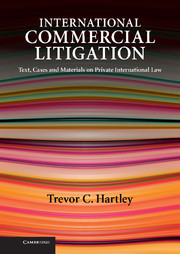Book contents
- Frontmatter
- Contents
- Table of panels
- List of figures
- Preface
- Acknowledgments
- Terminology
- Table of Latin phrases
- List of abbreviations
- Table of cases
- Table of cases (European Court of Justice, numerical order)
- Table of legislative instruments
- PART I STARTING OFF
- PART II JURISDICTION
- PART III FOREIGN JUDGMENTS
- PART IV PROCEDURE
- PART V CHOICE OF LAW
- 22 Introduction to choice of law
- 23 Torts
- 24 Contracts: the principle of party autonomy
- 25 Contracts: legal policy and choice of law
- 26 Contracts: regulating business, protecting employees and helping consumers
- 27 Foreign currency
- 28 Property: tangible movables
- 29 Contractual rights and property interests – I
- 30 Contractual rights and property interests – II
- 31 Contractual rights and property interests – III
- PART VI EXTRATERRITORIALITY
- Bibliography
- Index
31 - Contractual rights and property interests – III
from PART V - CHOICE OF LAW
- Frontmatter
- Contents
- Table of panels
- List of figures
- Preface
- Acknowledgments
- Terminology
- Table of Latin phrases
- List of abbreviations
- Table of cases
- Table of cases (European Court of Justice, numerical order)
- Table of legislative instruments
- PART I STARTING OFF
- PART II JURISDICTION
- PART III FOREIGN JUDGMENTS
- PART IV PROCEDURE
- PART V CHOICE OF LAW
- 22 Introduction to choice of law
- 23 Torts
- 24 Contracts: the principle of party autonomy
- 25 Contracts: legal policy and choice of law
- 26 Contracts: regulating business, protecting employees and helping consumers
- 27 Foreign currency
- 28 Property: tangible movables
- 29 Contractual rights and property interests – I
- 30 Contractual rights and property interests – II
- 31 Contractual rights and property interests – III
- PART VI EXTRATERRITORIALITY
- Bibliography
- Index
Summary
So far, we have been considering the law of England and the Commonwealth. In this chapter, we turn to the United States. In the beginning, US courts adopted the same approach as English courts.
Original approach
United States (New York)
Republic of Iraq v. First National City Bank
US Court of Appeals for the Second Circuit
353 F 2d 47 (1965)
Background
In 1968, a revolution took place in Iraq, which resulted in the abolition of the monarchy and the establishment of a republic. The United States recognized the new regime. The erstwhile king, Faisal II, was killed in the course of the revolution. Subsequently, the new government adopted legislation (Ordinance No. 23) confiscating all the property of his dynasty. The late king had had a deposit account in New York with a New York trust company, Irving Trust; he had also owned shares in a Canadian investment trust which were in a custody account with Irving Trust. The question before the court was whether the confiscation would be recognized with regard to these items of property. The district court held that it would not. The Republic of Iraq appealed.
Friendly, Circuit Judge
The principal questions raised in this appeal are the proper definition of the act of state doctrine and its application to foreign confiscation decrees purporting to affect property within the United States. Although difficulty is sometimes encountered in drawing the line between an ‘act of state’ and more conventional foreign decrees or statutes claimed to be entitled to respect by the forum, the Ordinance involved in this case is nowhere near the boundary. […]
- Type
- Chapter
- Information
- International Commercial LitigationText, Cases and Materials on Private International Law, pp. 777 - 800Publisher: Cambridge University PressPrint publication year: 2009



